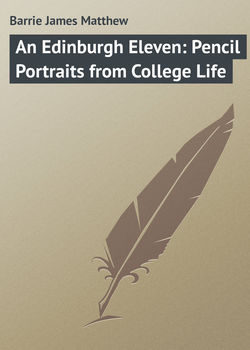An Edinburgh Eleven: Pencil Portraits from College Life

Реклама. ООО «ЛитРес», ИНН: 7719571260.
Оглавление
Barrie James Matthew. An Edinburgh Eleven: Pencil Portraits from College Life
I. LORD ROSEBERY
II. PROFESSOR MASSON
III. PROFESSOR JOHN STUART BLACKIE
IV. PROFESSOR CALDERWOOD
V. PROFESSOR TAIT
VI. PROFESSOR CAMPBELL FRASER
VII. PROFESSOR CHRYSTAL
VIII. PROFESSOR SELLAR
IX. MR. JOSEPH THOMSON
X. ROBERT LOUIS STEVENSON
XI. REV. WALTER C. SMITH, D.D
Отрывок из книги
Though a man might, to my mind, be better employed than in going to college, it is his own fault if he does not strike on some one there who sends his life off at a new angle. If, as I take it, the glory of a professor is to give elastic minds their proper bent, Masson is a name his country will retain a grip of. There are men who are good to think of, and as a rule we only know them from their books. Something of our pride in life would go with their fall. To have one such professor at a time is the most a university can hope of human nature; so Edinburgh need not expect another just yet. These, of course, are only to be taken as the reminiscences of a student. I seem to remember everything Masson said, and the way he said it.
Having, immediately before taken lodgings in a crow's nest, my first sight of Masson was specially impressive. It was the opening of the session, when fees were paid, and a whisper ran round the quadrangle that Masson had set off home with three hundred one-pound notes stuffed into his trouser pockets. There was a solemn swell of awestruck students to the gates, and some of us could not help following him. He took his pockets coolly. When he stopped it was at a second-hand bookstall, where he rummaged for a long time. Eventually he pounced upon a dusty, draggled little volume, and went off proudly with it beneath his arm. He seemed to look suspiciously at strangers now, but it was not the money but the book he was keeping guard over. His pockets, however, were unmistakably bulging out. I resolved to go in for literature.
.....
When the news of Carlyle's death reached the room, Masson could not go on with his lecture. Every one knows what Carlyle has said of him; and no one who has heard it will ever forget what he has said of Carlyle. Here were two men who understood each other. One of the Carlylean pictures one loves to dwell on shows them smoking together, with nothing breaking the pauses but Mrs. Carlyle's needles. Carlyle told Masson how he gave up smoking and then took to it again. He had walked from Dumfriesshire to Edinburgh to consult a doctor about his health, and was advised to lose his pipe. He smoked no more, but his health did not improve, and then one day he walked in a wood. At the foot of a tree lay a pipe, a tobacco pouch, a match-box. He saw clearly that this was a case of Providential interference, and from that moment he smoked again. There the professor's story stops. I have no doubt, though, that he nodded his head when Carlyle explained what the pipe and tobacco were doing there. Masson's "Milton" is, of course, his great work, but for sympathetic analysis I know nothing to surpass his "Chatterton." Lecturing on Chatterton one day, he remarked, with a slight hesitation, that had the poet mixed a little more in company and – and smoked, his morbidness would not have poisoned him. That turned my thoughts to smoking, because I meant to be a Chatterton, but greater. Since then the professor has warned me against smoking too much. He was smoking at the time.
This is no place to follow Masson's career, nor to discuss his work. To reach his position one ought to know his definition of a man of letters. It is curious, and, like most of his departures from the generally accepted, sticks to the memory. By a man of letters he does not mean the poet, for instance, who is all soul, so much as the strong-brained writer whose guardian angel is a fine sanity. He used to mention John Skelton, the Wolsey satirist, and Sir David Lindsay, as typical men of letters from this point of view, and it is as a man of letters of that class that Masson is best considered. In an age of many whipper-snappers in criticism, he is something of a Gulliver.
.....